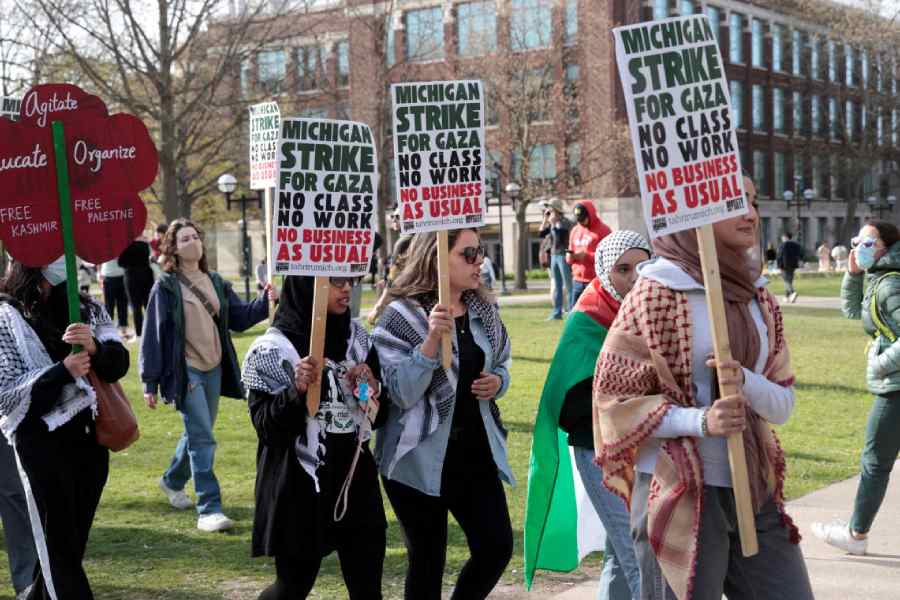We are witnessing today an amazing twin-event relating to Gaza: the fascistic Benjamin Netanyahu regime, backed by a phalanx of metropolitan powers, is slaughtering Palestinians, declaring them to be ‘no better than animals’; but common people across the world are spontaneously rising in protest, solidarizing with the Palestinians and holding demonstrations against this genocide. If the former, representing the horrendous world we live in, fills one with disgust, the latter, presaging a new world of peace and fraternity, fills one with hope.
Of special significance are the demonstrations currently sweeping across American universities demanding that these institutions should ‘divest’ funds invested in companies linked to Israel and its military complex. Many rightly see parallels between these demonstrations and the anti-Vietnam War protests that had rocked American campuses in the late Sixties. But the present movement is even more significant than the earlier one; first, because there is no draft involved now and, hence, not even a whiff of self-interest behind students’ actions; and second, because it comes in the wake of a long period of Islamophobia, of demonising Muslims as the ‘Other’, and is undeterred by such manufactured antipathy.
Against this we also have a revival of McCarthy-style repression reminiscent of the 1950s. Such repression is defended on the grounds that the Gaza Solidarity Encampment expresses anti-semitism; this, however, is absurd for it portrays an anti-genocide movement as anti-semitic, and does so despite the participation in it of large numbers of Jewish students. Stray anti-semitic remarks may have been made by some fringe elements (such elements can be found everywhere), but to call the movement anti-semitic amounts to, as the agitating students put it, “weaponizing anti-semitism”. In fact, anti-semitism is likely to be far more prevalent among the advocates of repression, several of whom have had links with known fascist elements in the United States of America and abroad (like Stepan Bandera’s followers in Ukraine).
Calling the current repression in the US ‘McCarthyite’ may be defended on the grounds that, as in the Fifties, a group of ultra-Right Republican lawmakers are in the forefront of it; but the differences are also significant. The primary targets at present are not the arts but the universities; the presidents of several universities have been summoned by right-wing lawmakers, asked to use the police against agitating students, and, if hesitant to do so, made to resign. The latest case relates to Columbia University whose president called the New York police to the campus to remove the ‘camps’ set up by students; it arrested nearly 100 agitating students, but, as the agitation still did not subside, ten members of the Congress led by Elise Stefanik have demanded the president’s resignation.
Besides, the McCarthyism of the Fifties had arisen in the context of the Cold War and had communists as its target. Today’s repression does not have such a specific target; it is in effect against the freedom of expression generally. Though dealing with the Gaza situation, it believes that freedom of expression must be curtailed if it criticises American imperialist policies; that students and faculty must close their eyes to the real world where there is genocide, settler colonialism and apartheid if these are practised by an American ally with American support.
The current attempt by the American Right, therefore, is to change the nature of universities so that speaking the truth no longer remains their avowed objective. It is significant that nobody advocating police repression on the campus has argued that what the students are saying is incorrect, that a genocide is not occurring in Gaza, or that the reports of deaths in Gaza are exaggerated; the opposition to students is not on the veracity of what they are saying but on the grounds that their alleged motive, the one attributed to them (anti-semitism), is wrong. On this precedent any expression of anguish by students and faculty over any unpleasant truth associated with US imperialism would invite not discussion in society but similar penal measures until universities become fully insensitive to imperialism’s depredations. This would eliminate the most well-informed and morally-sensitive group, that is teachers and students in academia, from playing its legitimate critical role in society.
Silencing of criticism of the Gaza genocide is not restricted to the US alone; it is pervasive in all metropolitan countries. In Berlin, the police stormed a Congress being held on Palestine on April 12, broke up a demonstration against this very storming on April 20, and attacked a peaceful protest ‘camp’ on April 21. The German government even denied a visa to a visiting American philosopher because of her sympathy for the Palestinian cause. Germany, of course, may suffer from a sense of guilt because of the Holocaust; but similar repression is occurring elsewhere too.
The repression against the opposition to Israeli genocide is not an isolated event; it heralds a change in the nature of academia, the necessity for which arises because the metropolitan powers expect the coming period to be one where conflicts would be ‘resolved’ through violent repression rather than through negotiations. Palestine itself is a pointer to this future. The US and other metropolitan countries are committed to a ‘two-State’ solution to the conflict. Yet, every time the question of full UN membership for Palestine comes up, the US vetoes it in the Security Council, as it did on April 19. The US obviously visualises nothing beyond what currently exists, namely a Palestinian Authority; it certainly does not visualise a full Palestinian State. A similar imposition of imperialist diktat is expected to settle other conflicts too.
Prabhat Patnaik is Professor Emeritus, Centre for Economic Studies and Planning, Jawaharlal Nehru University, New Delhi










